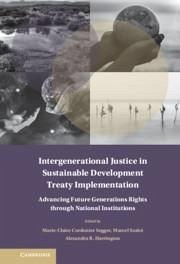Intergenerational Justice in Sustainable Development Treaty Implementation
Herausgeber: Cordonier Segger, Marie-Claire; Harrington, Alexandra R; Szabó, Marcel
Intergenerational Justice in Sustainable Development Treaty Implementation
Herausgeber: Cordonier Segger, Marie-Claire; Harrington, Alexandra R; Szabó, Marcel
- Gebundenes Buch
- Merkliste
- Auf die Merkliste
- Bewerten Bewerten
- Teilen
- Produkt teilen
- Produkterinnerung
- Produkterinnerung
Transformations in economy, technology, society and the environment mean today's decisions affect quality of life for all generations. This text offers insights for lawyers, academics, policy-makers, businesses and leaders interested in intergenerational equity across national and international law, policy and practice for sustainable development.
Andere Kunden interessierten sich auch für
![Restorative Justice and Family Violence Restorative Justice and Family Violence]() Heather Strang / John Braithwaite (eds.)Restorative Justice and Family Violence52,99 €
Heather Strang / John Braithwaite (eds.)Restorative Justice and Family Violence52,99 €![Restorative Justice and Family Violence Restorative Justice and Family Violence]() Heather Strang / John Braithwaite (eds.)Restorative Justice and Family Violence111,99 €
Heather Strang / John Braithwaite (eds.)Restorative Justice and Family Violence111,99 €![Predator in a Dress Predator in a Dress]() Greg MulliganPredator in a Dress18,99 €
Greg MulliganPredator in a Dress18,99 €![Family Violence and Criminal Justice Family Violence and Criminal Justice]() Brian P. PayneFamily Violence and Criminal Justice260,99 €
Brian P. PayneFamily Violence and Criminal Justice260,99 €![Justice for All Justice for All]() Norman J. JohnsonJustice for All61,99 €
Norman J. JohnsonJustice for All61,99 €![Absolute Justice Absolute Justice]() David CauthenAbsolute Justice22,99 €
David CauthenAbsolute Justice22,99 €![Intergenerational Programs Intergenerational Programs]() Valerie KuehneIntergenerational Programs69,99 €
Valerie KuehneIntergenerational Programs69,99 €-
-
-
Transformations in economy, technology, society and the environment mean today's decisions affect quality of life for all generations. This text offers insights for lawyers, academics, policy-makers, businesses and leaders interested in intergenerational equity across national and international law, policy and practice for sustainable development.
Hinweis: Dieser Artikel kann nur an eine deutsche Lieferadresse ausgeliefert werden.
Hinweis: Dieser Artikel kann nur an eine deutsche Lieferadresse ausgeliefert werden.
Produktdetails
- Produktdetails
- Verlag: Cambridge University Press
- Seitenzahl: 500
- Erscheinungstermin: 15. Juli 2021
- Englisch
- Abmessung: 232mm x 156mm x 51mm
- Gewicht: 1308g
- ISBN-13: 9781108488020
- ISBN-10: 1108488021
- Artikelnr.: 60065635
- Herstellerkennzeichnung
- Libri GmbH
- Europaallee 1
- 36244 Bad Hersfeld
- gpsr@libri.de
- Verlag: Cambridge University Press
- Seitenzahl: 500
- Erscheinungstermin: 15. Juli 2021
- Englisch
- Abmessung: 232mm x 156mm x 51mm
- Gewicht: 1308g
- ISBN-13: 9781108488020
- ISBN-10: 1108488021
- Artikelnr.: 60065635
- Herstellerkennzeichnung
- Libri GmbH
- Europaallee 1
- 36244 Bad Hersfeld
- gpsr@libri.de
Preface; 1. Introduction; 2. The theoretical framework for international
legal principles of intergenerational equity and implementation through
national institutions; Part I. Introduction to Treaty Law on
Intergenerational Justice and Codifying Sustainability: 3. International
treaty law and policy for future generations; 4. Intergenerational justice
under international treaty law: the obligations of the state to future
generations; 5. The use of international human rights norms to implement
international solidarity; Part II. Key Challenges in Domestic
Implementation of Intergenerational Justice: 6. Future generations as a
counterweight; 7. Future generations institutions to implement
international obligations towards future generations; Part III. Law and
Policy Innovations for Inter-Generational Justice: 8. Sustainability in
European constitutional; 9. The principle of intergenerational solidarity
in reshaping constitutional rights and obligations: an example from
Portugal; 10. Time to think: sustainable development, future generations
and the individual; 11. Claims and petitions regarding environment
preservation for future generations; 12. Reasons and means of public
participation; 13. Giving the voice of the future a word in the present;
14. Unsustainability as an economic problem; 15. Intergenerational equity
and the European constitution; 16. Scientific uncertainty as a key obstacle
to efficient legal protection of the environmental interests of future
generations; 17. Transformative knowledge and solutions in sustainability
governance; Part IV. Implementing Sustainability through National
Institutions - Case Studies: 18. Institutions for a sustainable future: the
former Israeli commission for future generations; 19. Norway - Norwegian
ombudsman for children; 20. Institutions for a sustainable future: the
german parliamentary advisory council on sustainable development; 21. Power
over coming generations - committee for the future in the eduskunta, the
parliament of Finland; 22. Welsh commissioner for sustainable futures; 23.
Parliamentary commissioner for the environment, New Zealand; 24. Canadian
commissioner of the environment and sustainable development; 25.
Intergenerational justice in colombian governance & peace accords; 26.
Indigenous peoples and inter-generational equity in Mexico; 27. Legal
innovations for inter-generational justice in sustainable landscapes
management of democratic republic of Congo; 28. Local indigenous planning
instruments for intergenerational equity in ahousaht traditional
territories of Canada; 29. A comparative analysis of model institutisons:
diversity in reaching common goals; 30. Comparing progress in
inter-generational governance; 31. International institutions for future
generations and democratic legitimacy; Part V. Regional Trends in
Intergenerational Justice: 32. A European human rights perspective on
national sustainable development institutions; 33. Embedding
intergenerational justice across government: regional trends in Africa; 34.
Intergenerational equity, justice, and modern treaties between first
nations communities and Canada; 35. Institutions for future generations in
Asia; Part VI. Future Trends: 36. Equity across generations in implementing
international law on water; 37. Intergenerational justice in the Paris
agreement on climate change; 38. The four-branches model of government -
representing future generations; 39. Intergenerational equity in
sustainable development treaty implementation.
legal principles of intergenerational equity and implementation through
national institutions; Part I. Introduction to Treaty Law on
Intergenerational Justice and Codifying Sustainability: 3. International
treaty law and policy for future generations; 4. Intergenerational justice
under international treaty law: the obligations of the state to future
generations; 5. The use of international human rights norms to implement
international solidarity; Part II. Key Challenges in Domestic
Implementation of Intergenerational Justice: 6. Future generations as a
counterweight; 7. Future generations institutions to implement
international obligations towards future generations; Part III. Law and
Policy Innovations for Inter-Generational Justice: 8. Sustainability in
European constitutional; 9. The principle of intergenerational solidarity
in reshaping constitutional rights and obligations: an example from
Portugal; 10. Time to think: sustainable development, future generations
and the individual; 11. Claims and petitions regarding environment
preservation for future generations; 12. Reasons and means of public
participation; 13. Giving the voice of the future a word in the present;
14. Unsustainability as an economic problem; 15. Intergenerational equity
and the European constitution; 16. Scientific uncertainty as a key obstacle
to efficient legal protection of the environmental interests of future
generations; 17. Transformative knowledge and solutions in sustainability
governance; Part IV. Implementing Sustainability through National
Institutions - Case Studies: 18. Institutions for a sustainable future: the
former Israeli commission for future generations; 19. Norway - Norwegian
ombudsman for children; 20. Institutions for a sustainable future: the
german parliamentary advisory council on sustainable development; 21. Power
over coming generations - committee for the future in the eduskunta, the
parliament of Finland; 22. Welsh commissioner for sustainable futures; 23.
Parliamentary commissioner for the environment, New Zealand; 24. Canadian
commissioner of the environment and sustainable development; 25.
Intergenerational justice in colombian governance & peace accords; 26.
Indigenous peoples and inter-generational equity in Mexico; 27. Legal
innovations for inter-generational justice in sustainable landscapes
management of democratic republic of Congo; 28. Local indigenous planning
instruments for intergenerational equity in ahousaht traditional
territories of Canada; 29. A comparative analysis of model institutisons:
diversity in reaching common goals; 30. Comparing progress in
inter-generational governance; 31. International institutions for future
generations and democratic legitimacy; Part V. Regional Trends in
Intergenerational Justice: 32. A European human rights perspective on
national sustainable development institutions; 33. Embedding
intergenerational justice across government: regional trends in Africa; 34.
Intergenerational equity, justice, and modern treaties between first
nations communities and Canada; 35. Institutions for future generations in
Asia; Part VI. Future Trends: 36. Equity across generations in implementing
international law on water; 37. Intergenerational justice in the Paris
agreement on climate change; 38. The four-branches model of government -
representing future generations; 39. Intergenerational equity in
sustainable development treaty implementation.
Preface; 1. Introduction; 2. The theoretical framework for international
legal principles of intergenerational equity and implementation through
national institutions; Part I. Introduction to Treaty Law on
Intergenerational Justice and Codifying Sustainability: 3. International
treaty law and policy for future generations; 4. Intergenerational justice
under international treaty law: the obligations of the state to future
generations; 5. The use of international human rights norms to implement
international solidarity; Part II. Key Challenges in Domestic
Implementation of Intergenerational Justice: 6. Future generations as a
counterweight; 7. Future generations institutions to implement
international obligations towards future generations; Part III. Law and
Policy Innovations for Inter-Generational Justice: 8. Sustainability in
European constitutional; 9. The principle of intergenerational solidarity
in reshaping constitutional rights and obligations: an example from
Portugal; 10. Time to think: sustainable development, future generations
and the individual; 11. Claims and petitions regarding environment
preservation for future generations; 12. Reasons and means of public
participation; 13. Giving the voice of the future a word in the present;
14. Unsustainability as an economic problem; 15. Intergenerational equity
and the European constitution; 16. Scientific uncertainty as a key obstacle
to efficient legal protection of the environmental interests of future
generations; 17. Transformative knowledge and solutions in sustainability
governance; Part IV. Implementing Sustainability through National
Institutions - Case Studies: 18. Institutions for a sustainable future: the
former Israeli commission for future generations; 19. Norway - Norwegian
ombudsman for children; 20. Institutions for a sustainable future: the
german parliamentary advisory council on sustainable development; 21. Power
over coming generations - committee for the future in the eduskunta, the
parliament of Finland; 22. Welsh commissioner for sustainable futures; 23.
Parliamentary commissioner for the environment, New Zealand; 24. Canadian
commissioner of the environment and sustainable development; 25.
Intergenerational justice in colombian governance & peace accords; 26.
Indigenous peoples and inter-generational equity in Mexico; 27. Legal
innovations for inter-generational justice in sustainable landscapes
management of democratic republic of Congo; 28. Local indigenous planning
instruments for intergenerational equity in ahousaht traditional
territories of Canada; 29. A comparative analysis of model institutisons:
diversity in reaching common goals; 30. Comparing progress in
inter-generational governance; 31. International institutions for future
generations and democratic legitimacy; Part V. Regional Trends in
Intergenerational Justice: 32. A European human rights perspective on
national sustainable development institutions; 33. Embedding
intergenerational justice across government: regional trends in Africa; 34.
Intergenerational equity, justice, and modern treaties between first
nations communities and Canada; 35. Institutions for future generations in
Asia; Part VI. Future Trends: 36. Equity across generations in implementing
international law on water; 37. Intergenerational justice in the Paris
agreement on climate change; 38. The four-branches model of government -
representing future generations; 39. Intergenerational equity in
sustainable development treaty implementation.
legal principles of intergenerational equity and implementation through
national institutions; Part I. Introduction to Treaty Law on
Intergenerational Justice and Codifying Sustainability: 3. International
treaty law and policy for future generations; 4. Intergenerational justice
under international treaty law: the obligations of the state to future
generations; 5. The use of international human rights norms to implement
international solidarity; Part II. Key Challenges in Domestic
Implementation of Intergenerational Justice: 6. Future generations as a
counterweight; 7. Future generations institutions to implement
international obligations towards future generations; Part III. Law and
Policy Innovations for Inter-Generational Justice: 8. Sustainability in
European constitutional; 9. The principle of intergenerational solidarity
in reshaping constitutional rights and obligations: an example from
Portugal; 10. Time to think: sustainable development, future generations
and the individual; 11. Claims and petitions regarding environment
preservation for future generations; 12. Reasons and means of public
participation; 13. Giving the voice of the future a word in the present;
14. Unsustainability as an economic problem; 15. Intergenerational equity
and the European constitution; 16. Scientific uncertainty as a key obstacle
to efficient legal protection of the environmental interests of future
generations; 17. Transformative knowledge and solutions in sustainability
governance; Part IV. Implementing Sustainability through National
Institutions - Case Studies: 18. Institutions for a sustainable future: the
former Israeli commission for future generations; 19. Norway - Norwegian
ombudsman for children; 20. Institutions for a sustainable future: the
german parliamentary advisory council on sustainable development; 21. Power
over coming generations - committee for the future in the eduskunta, the
parliament of Finland; 22. Welsh commissioner for sustainable futures; 23.
Parliamentary commissioner for the environment, New Zealand; 24. Canadian
commissioner of the environment and sustainable development; 25.
Intergenerational justice in colombian governance & peace accords; 26.
Indigenous peoples and inter-generational equity in Mexico; 27. Legal
innovations for inter-generational justice in sustainable landscapes
management of democratic republic of Congo; 28. Local indigenous planning
instruments for intergenerational equity in ahousaht traditional
territories of Canada; 29. A comparative analysis of model institutisons:
diversity in reaching common goals; 30. Comparing progress in
inter-generational governance; 31. International institutions for future
generations and democratic legitimacy; Part V. Regional Trends in
Intergenerational Justice: 32. A European human rights perspective on
national sustainable development institutions; 33. Embedding
intergenerational justice across government: regional trends in Africa; 34.
Intergenerational equity, justice, and modern treaties between first
nations communities and Canada; 35. Institutions for future generations in
Asia; Part VI. Future Trends: 36. Equity across generations in implementing
international law on water; 37. Intergenerational justice in the Paris
agreement on climate change; 38. The four-branches model of government -
representing future generations; 39. Intergenerational equity in
sustainable development treaty implementation.








